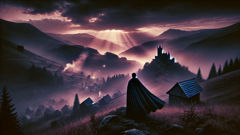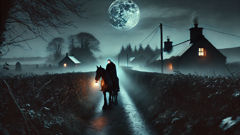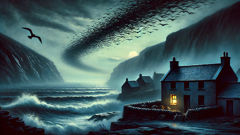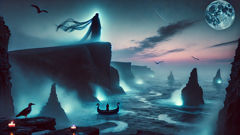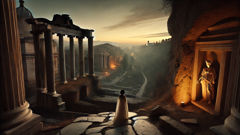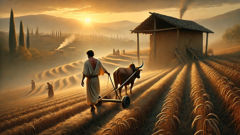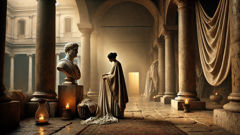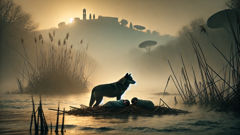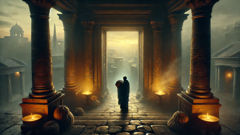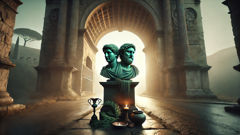Introduction
In a high, wind-bent valley of Romania where the Carpathians lean close like giant guardians, there stood a village whose roofs had grown silver with the breath of many winters and whose people told their stories by hearth-light, by low fires and long evenings. They had once known a sky full of ordinary wonders: the steady arc of the sun, the cool pale face of the moon, an orchard of stars hung as if on invisible threads. One summer, however, misfortune crept over the ridges. The devils — strange, cunning shapes with eyes like coals and laughter that cut the air — came down from the forgotten peaks and took the sun and moon into their black pockets. Day and night collapsed into a sullen twilight, crops withered in fields that could no longer trust the seasons, and mothers hushed their children with fear. From that trembling hour, the valley’s songs changed into pleading laments. It was in this new, shadowed world that Greuceanu was born: a child of the region whose name would be spoken with reverence and wonder. He grew swift as a mountain wind and steady as oak roots. Where others saw only gloom, Greuceanu saw a task: to mend the sky. He swore he would follow the devils wherever they hid the light, whether in caverns under frozen lakes or inside the folds of the world. This promise set him on a road that would test his strength and cunning, put him up against beasts of legend and riddles older than stone, and teach him what a heart must give when the world needs light again. He would not go alone; allies both human and uncanny would cross his path, and the land itself — rivers, forests, and the very starlit peaks — would answer him in ways the old stories still remember.
Into the Devil's Domain
Greuceanu's first steps away from the warm hearths of his village were accompanied by the hush of a world gone quiet. The fields were trimmed by shadow rather than sun; even the river moved with a slower, thoughtful current as if it had been asked to keep a secret. The old women who mended nets and sewed children’s shirts clasped his hands and gave him simple fare: bread thick with walnuts, a strip of smoked cheese, and a strip of coarse cloth with a knot tucked inside — a charm against deception. He wrapped the charm beneath his tunic and carried the bread like a promise to hunger. The first days were a test of maps and memory. The villagers remembered songs that led to the places devils favored: a low valley where goats would not graze, a ridge where the snow stayed long and did not melt, an oak whose branches were stripped bare as if a giant had eaten its leaves. Greuceanu visited each marker like a pilgrim taking bearings and speaking to stones. At the edge of a marsh, a heron with eyes like polished amber watched his boots sink into soggy peat. 'Why do you go?' it seemed to ask, tilting its head. Greuceanu answered aloud, though only the air and the bird listened. 'To bring back what was stolen. To give the children of my village back their days.' The heron beat its wings and rose, guiding him along a reed-lined track that led to a hidden ford where the devils first stamped their footprints in the mud.
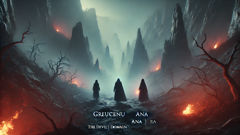
[IMAGE]
Between the first and second days of walking, Greuceanu met two companions who would shape the road. A woman named Ana, sharp of eye and steady with a sling, joined him with plans of her own. She had lost a brother in the pale time and wanted the moon for reasons beyond common hunger; the night had become a broker of bad fortunes and she wanted helplessness to end in the valley. Then came an old huntsman, Jora, whose bow had once brought down a boar the size of a cart and whose past kept his laughter light but his memory long. Together they advanced into the places the devils had spoiled: orchards where fruit would not ripen, hills that swallowed sound, and glens that gathered fog like a shawl. In the deeper wood, trees bent to form narrow corridors and murmured among themselves in the low voice of leaves. Greuceanu learned to read the forest the way a navigator reads stars: not in single signs but in the hush between them. A fox, sleek and slow, appeared on one nocturnal ridge and seemed to mark their path. At a stream where the water’s surface had frozen though the air remained mild, he found a stone that held warm beneath his palm — a stone whose heat was not of sun or fire but of memory. Greuceanu pressed his ear to it and heard a faint rattling like chains and the distant cackling of devils arranging stolen light like silver coins. 'They keep the sun and moon where the world forgets to look,' the stone seemed to say by way of echo, and Greuceanu felt the future thicken with purpose.
They came upon the first actual sign of the devils' handiwork at the entrance to a cave, where a circle of scorched grass ran like the rim of a ring around the mouth. Bones of small beasts made neat piles as if someone had been sorting the world’s leftovers. The devils often liked to leave messages: the prints of three-toed feet, a smear of black like ink spilled by a careless hand, a cluster of dull feathers that might once have been wing. Greuceanu's eyes darted to the sky even though it offered little; he held to a plan he had formed in the dark hours — to move not as a soldier might, in straight lines and loud claims, but as a craftsman might, with patient hands and a mind for leverage. The devils loved boasting and thought riddles were only as dangerous as knives until someone showed them otherwise. He and his companions set nets where light might pass and traps where noise might fall; they made small sacrifices of food and smoke to draw out curious watchers.
Each trap taught Greuceanu more of the devils' habits. They favored the lonely, the high places hidden from travelers, and caverns that smelled of old iron and dried herbs. They had a penchant for collecting things that glowed: bits of glass from abandoned windows, coins whose shine had been coaxed back by moonlight, and, of course, the sun and the moon in the form of small orbs wrapped in heavy black cloth. Greuceanu once watched from behind a crag as a pair of devils argued over a stolen shard; their voices were like the scrape of branches. 'Small things for small men,' one said, before the other snatched the prize and tucked it under his belt. Greuceanu noticed how they treated the orbs with a mixture of fear and greed, as if the light had teeth and could bite the thief. He learned to move like a shadow but think like the light’s owner. He studied the devils' sleeping patterns, the way they gathered in small congregations to play games of mockery at twilight, and the moments when one might wander to tend a lamp or sharpen a knife. More than once he had to pull away from the edge of courage, because courage that is careless becomes only a story about what might have been rather than what is.
Time spread like a tapestry, and the weave grew more intricate. At a mountain pass that smelled of crushed thyme, Greuceanu encountered a woman with hair like spun silver whose eyes reflected the shape of the moon. She offered him a piece of advice that was simple and cutting: 'If you would steal the sky, you must first be willing to lend your body to the earth.' He did not understand then the full measure of her counsel, but later would remember how he slept with his face in the cold dirt and woke with dreams of light tangled in tree roots. The closer they moved to the devils' true lair, the more the land itself resisted. Trees rearranged their branches to form labyrinths, and rocks shifted beneath the heel as if the mountain were breathing. Greuceanu learned to listen for the mountain's rhythm and step in time with it, because rushing broke the music of pathfinding. When they finally found the devils' outer keep, it was not a fortress of stone as much as a hollow where the air tasted metallic and the grass lay flat like a carpet of dark hands. Smoke rose in thin plumes not from hearths but from cauldrons where the devils cued the weather and practiced making storms. It seemed impossible that within such small clouds could rest the whole of day or night, but Greuceanu knew better; impossible things are often hidden in small places.
He prepared for the smallest possible intrusion and the longest possible wait. Under a sky that pretended with difficulty to be evening, Greuceanu sat hunched and watched the devils count their plunder. They laid out the sun and moon like two glowing apples, now dimmed by cloth but still insistently bright underneath. Greuceanu measured their shifts and missteps: a devil distracted by gambling, another by an argument over a song he had stolen. In that confession of smallness lay his chance. He moved when the devils' laughter reached a peak and the keep lay thin. Greuceanu moved like a reed bent by wind — not the force to break the devils but the patience to outlast them. He slipped the charm with the knot under his tunic, pressed his palm against the warm stone of the earth, and allowed himself, for a heartbeat, to believe he could carry day and night on his back. It remained for him to learn whether belief without guile would stand against those who had already learned to bind the world into darkness.
As his hand closed on the cloth-wrapped orbs, the devils began to stir. Their surprise was a sound like glass shattering, and a great throng came stumbling into the open, teeth like shuttered windows and nails clinging to their own dark armor. Greuceanu did not run. He could not carry both orbs and expect to outrun their guardians, but he could carry the plan of one. He tugged one orb free, the sun's small roundness warm against his palm like a stolen ember. With a shout that sounded more like a bell than a cry, he threw a coil of smoke and sprinted toward the woods, Ana and Jora guiding their steps by the soft sign language they had learned in each other's eyes. The devils howled, pounded after them, and for a time the world became a blur of sprinting feet, torn brush, and a sky that seemed to narrow at the edges. Greuceanu's chest thudded like a drum, but he held to a steadier rhythm — that of a man who knows what he carries must be kept against the tides of panic. Behind him the devils faltered, slowed by their own greed, because once a thing is taken it seems less like an achievement and more like a loss to be avenged. In that hesitation lay the thread he pulled until he and his companions were swallowed by night’s thin arms and the stolen sun, wrapped in his cloak, hummed as if it remembered a tune.
Greuceanu learned that theft from devils is never a straight line. For every step forward, the world posed a new choice: to save one light and leave the other to darkness, or to attempt the impossible and risk both. He chose the first and kept to it for the simple reason that sometimes saving one thing means saving many more than the one. With the sun secreted beneath his cloak the world began to remember warmth, and the river sighed as if handed back a familiar friend. But even as fields felt the return of sun, the moon's absence made the nights strangely thin: shadows no longer had soft edges, and people miscounted steps by the light of stars alone. Greuceanu's heart ached for the moon like one aches for a friend gone blind. He knew that the devils would not leave the theater of their victory without a final performance; they would shelter the moon differently, behind traps more cunning than the first. So he listened to the land for a new clue, watched how tired children looked to the sky, and prepared to step into the deeper dark for a second and more dangerous theft.
By the time he reached the place where the moon was held, Greuceanu had lost the lean certainty of the beginning and gained a steadier knowledge, an old-fashioned patience born of many small losses and recoveries. He realized that to steal the moon would require not only speed or strength but a kind of exchange: a giving of something of himself so the sky might take it in return. He placed his ear to the ground and heard not only the devils but also the breathing of the mountain, and in that breath he found a rhythm like the pulse of a sleeping giant. He synchronized his stride to that pulse and moved with the care of a man handling glass. When the devils lay in their dens counting their defeats, Greuceanu stole into their nest of pillows and tricks and, with a skill born of desperation, took the moon and wrapped it in a cloth blessed by a woman he had met beside a well. It sighed like a contented animal in his hands. He left the place quieter than he had entered it, leaving no insult and no taunt, only the knowledge that the world would be less dark because he had been willing to give himself to the task.
What he did not yet know was the cost. The devils would not forget; they would come seeking their light and ask for it in a voice like winter wind. Greuceanu, whose name would become a song, would come to learn that heroism is the art of giving back without counting the cost and that the greatest thefts are those that return what belongs to all. For now, however, he walked toward the valley with the stolen orbs wrapped beneath his cloak, and in each step the land steadied its breath as if remembering what it meant to be whole. His companions walked beside him, and the world, ever watchful, began to knit its torn seam with every mile he put between himself and the devils' keep.
The Theft and the Return
Returning to the village with the stolen orbs wrapped and hidden was only a part of Greuceanu's plan. He had to restore balance without inviting a reprisal that would take more than had been given back. The sun, when set free, climbed shyly at first, and crops inched toward better days; yet the moon's light was still folded away in places where night feasted on secrets. Greuceanu understood that the devils would not simply accept the reclaiming of things they had proudly stolen; instead they would seek a bargaining position in which they could take back what they had lost and make the people pay with fear. Greuceanu therefore prepared himself not only to hide light but to make the people's hope into a shield. He taught the villagers how to watch the horizon, how to kindle small, steady lights when dusk came so that the devils, who despised steady, communal efforts, would be confused. He asked the smith to hammer bright bands for the children to wear and told the shepherds to let their flocks move in open lines across the meadows so the devils could not hide like moths in the grass. It was as much strategy as superstition, and both worked in ways even he did not fully expect.
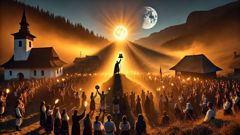
As the first of these measures took hold, the devils grew enraged. Their leader — a devourer called Hârtop, whose skin was ashen and whose voice could sound like wind through a cracked bell — called forth a storm of lesser demons and went to parley with the world. Hârtop's wrath sent wolves to herd mist and summoned winds that tried to erase tracks. Greuceanu's response was a mixture of cunning and compassion. When the devils sent trickery in the form of an old woman asking for a meal, he fed her. When Hârtop offered a challenge of strength, Greuceanu refused to meet it on terms of muscle alone; instead he suggested a contest of stories, because devils were fond of being admired for their own cleverness and often forgot their tasks when they found listeners. The devils, indulgent in their vices, took the bait and gathered to boast. Greuceanu told them of the sky's small griefs and of the way that children counted steps to the moonless night. In the hour of their distraction he slipped from their midst and, carrying the moon this time much closer to his chest than the sun had been, he ran toward the ridge where his village's old bell hung. The bell was a thing of ritual; when it rang, all who heard it felt a tether to one another. He wanted the moon's light to return not only to the fields and roofs but to the people's sense of being joined, because devils do not like people who stand together.
The chase that followed was more complicated than any footrace. Devils shape-shifted into familiar faces to confuse him — a mother who had long passed, a friend who wanted to share a piece of bread — but Greuceanu had learned to look beyond the face to the hands and the gait; devils could mimic smiles but not the small things honesty keeps. In a ravine thick with mist he encountered a creature formed of discarded shadows that tried to wring the stolen moon from his chest with words and sorrow. Greuceanu answered not with force but with a tale of the river's patience and the oak's steadiness, a story that made the shadow hesitate because it recognized an old truth. Stories are a weapon as strong as any blade in the hands of those who keep them fresh. Greuceanu's tales reminded the shadow of its own beginnings and, for the briefest of moments, bound it to the memory of water and soil rather than to greed.
Near the final passage, the devils launched their fiercest stratagem: a mirror that scattered fragments of the world into a thousand illusions. Greuceanu saw fields turned into deserts and saw his village buried beneath a sea of foaming birds. It would have been simple enough to falter and allow despair to take the orbs, but he had learned the value of a steady companion's voice. Ana, unseen until she called his name, picked the right instant to shout a memory — of a child eating a slice of bread stained with jam and laughing at a cloud shaped like a bear. That laugh, small and human, grounded Greuceanu. He closed his eyes and, feeling for the rhythm of the bell he planned to ring, walked toward sound rather than sight. Sound was honest; sound could not be fully stolen. Jora matched his steps from behind and in that tandem movement they turned the betrayals of the mirror into mere ripples.
When Greuceanu finally reached the bell, the devils made one last stand. Hârtop himself rose like a storm and demanded the return of what was rightfully his. He offered the world a bargain: keep the sun but give the devils the moon in exchange, or else suffer nights that never end. Greuceanu, who had already known what it meant to lose one light and then bring another back again, refused. He rang the bell. The sound rolled across the valley like a promise kept. The bell's tone anchored the people; mothers with their sleeves rolled to the elbow took their children in hand and stepped into the square, artisans set down tools, and shepherds brought flocks to form a line that cut through the deepening dark. The devils, thrown by the steadiness of communal defiance, faltered. Their spells, which favored the fractured solitude of fear, broke against the unadorned act of people standing together to meet the night.
The bell did more than call bodies; it summoned memories. Old songs, which lay like iron filings beneath skin, rose to the surface and made the air a thick cloth of recollection. The village began to sing without needing a leader, and the sound itself seemed to move through the bell's aftertones into the mountain's hidden fissures. In that chorus the moon grew uneasy in the devils' hands — small, round, and unwilling to remain captive to malice while its people sang. Hârtop, hearing his own power wane, tried to snatch the bell from its rope, but the rope held, braided by generations and stubborn as roots. Greuceanu, seeing his moment, leapt into the open with both orbs in his arms and held them high. The sun poured warm light across the valley; the moon returned with a cool silver that washed fields and faces into two shades of blessing. The devils shrank from it as wolves shrink from dawn. They could not stand against both sun and moon when the people they had tried to frighten stood together against fear.
Hârtop and his band retreated to the places they had come from, carrying with them only the knowledge that they had been thwarted by a stranger from a small valley. Greuceanu, Ana, and Jora were welcomed with a mixture of joy and shock, as if the village held a new kind of astonishment for the return of light. They celebrated not with feasts alone but with remembrances: they told and retold the story of the theft and the reclaiming, making small changes each time that embroidered the tale into a living tapestry. Children learned to name stars and the phases of the moon; elders taught younger ones the songs that had once anchored the world; and the community made a new ritual of ringing the bell every fortnight to show that nothing of the sky should be taken for granted. Greuceanu himself did not become prideful; he quietly walked the fields and sometimes sat beside the river where his reflection mixed with passing clouds, as if he were still practicing the art of listening to a world that had come back into its proper rhythm.
News of Greuceanu's deed traveled far beyond the valley. Travelers carried his name across high passes into villages where different languages braided their vowels and into cities whose stones knew imperial footfalls. Bards sang the tale and added flourishes: some made Greuceanu taller, some gave him a steed that could gallop upon the air like a gull, others said he had wrestled Hârtop and won at dawn. Each telling bent the story like a reed, making it more pliable and more lasting. In the telling, the heart of the action remained unchanged: a man from a small valley refused to let his people live under the rule of darkness and, by combining cunning with communal courage, managed to return a world to itself. It is the kind of story that endures because it asks nothing more of its listeners than to remember that light is a common thing, and that when people stand together it is harder for darkness to hide.
Greuceanu’s story did not end with a single victory. In time, other misfortunes would come — droughts, strange illnesses, the odd miser or tyrant whose appetite threatened the common good. Each time the valley had a choice: retreat into quiet fear or rise together. They often thought of Greuceanu, not as a saint set on a pedestal but as a pattern: a person who made a decision to act and whose acts taught others to act in turn. The devils, for their part, learned that stealing the sky was not simply an exercise in strength but a wound that bent toward community; they had underestimated how the bell and the songs and the simple habit of sharing bread could bind a group of people into something the devils could not easily tear. Greuceanu's thefts had been audacious, yes, but the real theft was of a kind that returned a treasure to its owners: he took back what belonged to everyone and gave it rightfully to them, a lesson that the valley kept with greater care than any jewel.
When Greuceanu was old and his hair had the color of the moon's first light, the children who once counted stars in fear now climbed his knees to hear the story anew. He would tell them not of the glory but of the small choices: how he had once given a piece of bread to a thirsty traveler, how he had learned to listen to a river, how he had refused to be tricked by the devils’ mimicry. Those details, he said, mattered more than feats of brute strength because they showed what a person must be when the world asks for courage. The tale traveled beyond the valley, braided with new versions and new listeners, but at its core remained the same promise — that light, once taken, can be returned by those who will not let fear be their only map. The hero's name lived on not as a relic but as an instruction. Greuceanu had stolen from devils, yes, but he had also taught a people how to keep their own light, and in that perpetuity he became, at once, a man and an idea: a figure who reminds us that acts done for the common good are the best kind of theft, because they restore what was always meant for all.
Conclusion
The Tale of Greuceanu remains a lantern held steady in the folklore of the Carpathian valleys: a narrative that gives courage its directions rather than its robes. It teaches that heroism is not a single loud event but a series of smaller commitments — to notice the strange footprints, to walk the quieter paths, to ring the communal bell when fear gathers. Greuceanu did not act alone; his courage was a thread woven through the village, through companions who matched his steps and the people who learned to stand together. In remembering how he reclaimed the sun and moon, listeners learn the practical magic of collective action and the quieter alchemy of keeping watch. The devils in the old songs represent the many ways communities can be diminished — by greed, by isolation, by the petty tricks that steal light in pieces. Greuceanu's answer was never about vanquishing darkness with spectacle but about teaching others to keep a steady flame. That lesson, as relevant in the age of satellites and electric lights as it was in the age of hearths and hands, speaks across time: when light is taken, it can be brought back not by a single proud theft but by people who remember to stand together, to sing, to ring the bell, and to pass the stories along. Even now, in cold seasons when clouds gather thick as doubt, a child in a little house in a Carpathian valley might look up at the sky and call Greuceanu's name, and in doing so they keep alive a promise — that brightness returns when people choose to claim it for one another.

